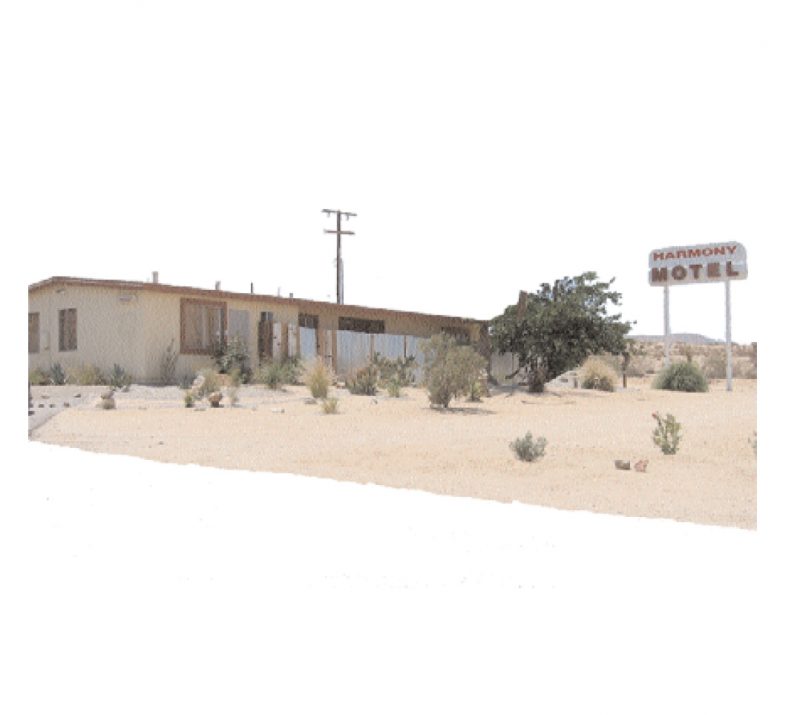- Six rooms, plus a detached bungalow
- Common kitchen
- Pool/jacuzzi
- Really, really good free coffee
- Price: $65/night
We three city-busy travelers unpile from the Landcruiser on a scorched ridge in Twentynine Palms (Whose cell phone is that? Somebody’s cell phone is ringing) to check into our weekend accommodations—a lackluster cinderblock rectangle with brown trim the shade of bad pantyhose, and a lettered signboard that reads, “Piece” and “No Wore No Wear.” Whose cell phone? Never mind. Ring the doorbell. Nobody answers. Nobody answers. It’s late, and they’ve given away our rooms. (Shit!) Whose cell phone? Nobody answers. We are hot. It’s the desert, it’s the butt end of May, it’s upwards of ninety. The world’s largest Marine base is located in Twentynine Palms, and the Iraq-like terrain and relentless climate made it a perfect training ground for the Operation Iraqi Freedom forces (No Wore No Wear). We ring again. Nobody nobody nobody. Then: Door opens. Somebody! A man with, it was agreed upon by all present, a significantly harmonic aura and a soothing minimalist aesthetic. The lobby is tiled in glossy bathhouse blue, the walls bare save for four arty portraits of behatted men in the desert (no ordinary arty behatted men—closer inspection reveals these men to be Bono, The Edge, and those other two U2 fellows posing under some nearby Joshua trees). The unclaimed cell phone rings distantly and erratically, but we’ve forgotten about it. The harmonic man—Jeffrey—shows us through a room filled with his sculptures—paint-weathered boards, gray rocks, materials that look roughed up by the sea, except that we’re in the desert—to the pool area, enclosed by corrugated metal sheets and more weathered wood planks, the kitchen (through a beaded curtain), the tastefully bare rooms. Two beds, with white cotton spreads. A jute rug over the khaki concrete floor. A pointy potted something that could be aloe. No phone. No mini shampoos or lotions—instead, a camping container of the environmentally friendly Dr. Bronner’s Peppermint Soap in the shower. The hot wind blows continuously, cooling nothing. We realize, as we return to get our bags from the truck, that the eternally ringing cell phone is not a cell phone at all, but a wind chime hanging in a tree.
The Harmony Motel, built in 1952, was always called the Harmony (the original sign was decorated with musical notes). There’s not a huge tradition of music in Twentynine Palms (save for U2’s brief tenure during the “Joshua Tree” era), but neither is it a place based on the presumption that “piece” is always preferable to its opposite. In the butt end of May 2003, every Pizza Hut and Chesterfield Chicken welcomes home the troops in general, or Greg Bule, or Tom Flam, or Mike Dee, in particular. Jeffrey’s homonymic antiwar position isn’t held in particularly humorous regard by the locals of Twentynine Palms. Sadly, hilariously, there was a protest rally scheduled against the motel during that period when things weren’t going so swimmingly in Iraq, but then the tide turned and the locals viewed Jeffrey’s position as arcanely objectionable rather than a patriotic menace, and called it off. He thrilled at the headline possibilities such a rally might have yielded—“Locals Protest Harmony!”—but the incident represented a disheartening pivot point. Jeffrey, already a little ulcer-ridden (despite his harmonic aura) from his two-year proprietorship in the desert, has decided to sell the motel and return to Venice Beach. But the Harmony Motel for Conscientious Travelers will continue to operate under new ownership, and those uniformed travelers, Flam and Bule and Dee and etc. (at whose “conscientiousness” we can only make a cynical guess), will return to the local Marine base, and harmony in Twentynine Palms, for the time being, will be superficially restored.





